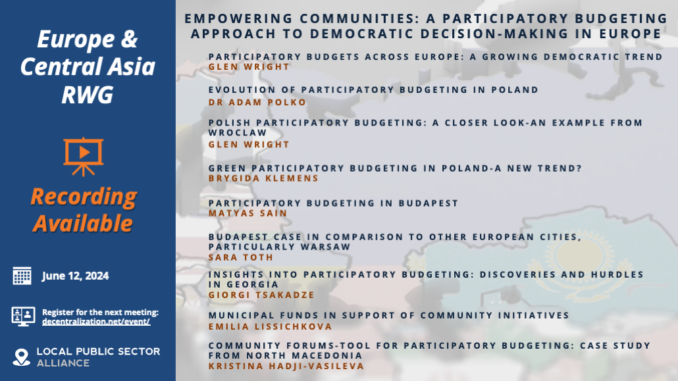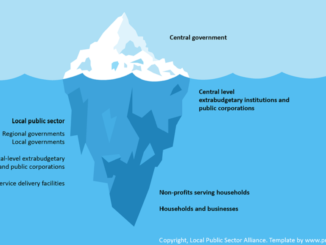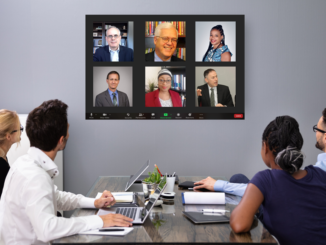
LPSA’s Regional Working Group on Europe & Central Asia (ECA) Open Meeting took place on June 12, 2024, (10:00 EDT/ 15:00 BST/ 16:00 CEST/ 19:00 UZT). The meeting was opened and moderated by Glen Wright, who serves as one of the co-chairs of the working group.
Glen introduced the meeting topic, provided an agenda overview, and introduced the speakers. He shared the Euroaktiv video on Participatory Budgets Across Europe: A Growing Democratic Trend. The video emphasized participatory budgeting as a growing democratic tool in Europe, enabling citizens to directly influence municipal spending. Citizens’ awareness of participatory budgeting varies across Europe, with concerns about politicians supporting it and sharing decision-making power. Poland has the highest number of cases, with Wroclaw being one of the most involved. Other countries, such as Romania, Scotland, the Netherlands, and Ireland, are exploring this process, but only a few have implemented it.
Dr. Adam Polko a professor at the University of Economics in Katowice (Poland), presented the evolution path of participatory budgeting in Poland. At the beginning, it was an informal group of residents who submitted project proposals. These proposals were then verified by officials, who selected the projects for a voting process. However, in 2018, the National Government decided to formalize the principles of participatory budgeting in the Municipal Government Act. It introduced significant changes by regulating the initial form of participatory budgeting and made it mandatory in the 66 cities with county right. Since then, changes in local practices led to a shift towards participatory governance, considered as a more flexible, local initiative-based form of participatory budgeting. Furthermore, Polko explored the differences between participatory budgeting and civil budgeting by presenting a case study of Dąbrowa Górnicza.
Mátyás Sain from City Hall of Budapest (Hungary) provided valuable insights into participatory budgeting in Budapest. For the past four years, the City Hall of Budapest has been actively using a participatory budgeting system and is gearing up for the start of the fifth period. What is particularly noteworthy is that individuals over 14 years old who live, work, or study in Budapest are eligible to participate in these programs. The process kicks off with the submission of ideas in the pre-determined areas (e.g., caring, green, open Budapest) with specific conditions (e.g., creating new, tangible objects) followed by an approval phase and culminating in a voting period. The absence of national legislation on participatory budgeting allows for higher flexibility, encouraging greater community involvement through citizens’ assembly and voting. Project preparation and implementation is the responsibility of the City Hall, which creates a significant administrative burden. However, this approach empowers residents to have a direct impact on the allocation of resources and the implementation of projects that best serve their needs.
Sára Tóth from the City Hall of Budapest (Hungary) elaborated on participatory budgeting in Budapest from a different perspective. The methodology involved desk research, field visits, interviews, and selecting cities with similar system designs (Warsaw and Madrid). Three aspects of participatory budgeting were compared: level of participation, budget impact, and representativeness. The Budapest PB is the only process out of the three that promotes PB’s original goal of redistributing wealth and supporting poorer neighborhoods. During her segment, she suggests that more resources are necessary for the participatory budgeting council and dedicated volunteers. Toth recommended three options for improved participatory budgeting: savings-based, school-based, and volunteer-based.
Giorgi Tsakadze, project coordinator at the Georgian Development Platform (Georgia), gave an overview of the participatory budgeting, discussing on the discoveries and hurdles in participatory budgeting in Georgia. The research was conducted by the Project: Support partner municipalities to effectively conduct participatory budgeting for FY2024, supported by USAID. The project covered 11 municipalities and conducted 110 in-depth interviews with stakeholders, including municipal councils, City Hall, project authors, supporters, NGOs, and mass media organizations. He highlighted the significant challenges in the process, namely: the lack of awareness among citizens, the availability of sufficient resources, managing participatory budgeting in a non-systemic, isolated way, and the lack of capacity in municipalities to effectively implement the participatory budgeting process. The recommendations include conducting comprehensive information campaigns to increase citizens’ awareness and involvement in participatory budgeting, training local self-government employees to support the processes, developing regulatory rules and instructions, and ensuring inclusive participation despite barriers like gender, age, ability, language, and socio-economic status.
Kristina Hadji-Vasileva, executive director of Strategic Development Consulting (North Macedonia), demonstrated how community forums can facilitate participatory decision-making and budgeting in North Macedonia. Citizen participation involves engaging citizens in decisions that affect their community, whether the impact is direct or indirect. She introduced the Project Forum, a platform where citizens work together to prioritize important issues within larger problem categories and focus on defining and resolving specific community issues, such as those related to the environment, tourism, or infrastructure. The Regional forum, held at a regional level in North Macedonia consisting of 8 statistical regions, aims to tackle shared issues among municipalities. At the regional forum, all municipalities in the region gather to collectively tackle common challenges in a more contextually relevant way. The Budget Forum acts as a platform for the municipality to demonstrate transparency and accountability to its citizens in an effective manner. In budget forum sessions, the municipality reviews the budget item by item, detailing specific figures and activities, to show citizens how limited funds will be allocated and projects prioritized.
Emilia Lissichkova, Chairperson of the Board of Trustees, AGORA Platform Association (Bulgaria), discussed her experience working with 10 Bulgarian municipalities to establish and operate municipal funds for community initiatives. This is a different approach towards the participatory budgeting process, when financial support is allocated for community initiatives and implementation. Lissichkova outlines the general framework of these municipal funds, which are established on the municipal budget with the decision of municipal councils and governed by rules adopted by municipal councils. They are based on the annual budget and developed through partnerships with local community organizations, financed from municipalities’ own financial resources. Municipal initiatives are implemented on public property, with some focusing on urban infrastructure. She emphasized that the administrative capacity of the municipal administration is crucial, especially in smaller municipalities, as they may not be experienced in writing project proposals.
The video presentation by Brygida Klemens, Assistant Professor, Opole University of Technology, Faculty of Economics and Management (Poland), provided valuable insight about a new trend in Poland known as green participatory budgeting. The study shows that more green projects are carried out in cities when local government units endorse project applications for the civic budget. The participatory budget provides several benefits to residents, such as enhanced urban spaces, infrastructure development, green areas for reducing air pollution, and promoting sustainable transport. She points out that environmental factors in urban development are increasingly urgent. Civic budgets can be valuable tools for involving citizens, particularly in improving residents’ quality of life and involving them in city planning. Establishing a civic budget database with standardized categories was identified as a good recommendation in green participatory budgeting.
Gábor Péteri who serves as one of the co-chairs of the working group concluded the meeting with scheduling the next quarterly meeting. A video of the meeting is available on YouTube. The links below provide access to the video segments of the different agenda items.
| No. | Agenda Item | Contributor | Slide Deck |
| 1. | Participatory Budgets Across Europe: A Growing Democratic Trend (The Video, Euroaktiv) | Glen Wright, ECA Working Group Co-Chair | View |
| 2. | Evolution of Participatory Budgeting in Poland | Dr. Adam Polko Department of Spatial and Environmental Economics University of Economics in Katowice, Poland | View |
| 3. | Polish Participatory Budgeting: A Closer Look (An example from Wroclaw, Poland) | Glen Wright | View |
| 4. | Green Participatory Budgeting in Poland – a new trend? | Brygida Klemens, Assistant Professor, Opole University of Technology, Faculty of Economics and Management, Poland | View |
| 5. | Participatory budgeting in Budapest | Mátyás Sain, City Hall of Budapest | View |
| 6. | Budapest case in comparison to other European Cities, particularly Warsaw | Sára Tóth, City Hall of Budapest | View |
| 7. | Q&A | Glen Wright | N/A |
| 8. | Insights into Participatory Budgeting: Discoveries and Hurdles in Georgia | Giorgi Tsakadze, Project Coordinator at the Georgian Development Platform | View |
| 9. | Municipal funds in support of community initiatives | Emilia Lissichkova Chairperson of Board of Trustees, AGORA Platform Association | View |
| 10. | Community Forums-tool for participatory budgeting: Case study from North Macedonia | Kristina Hadji-Vasileva, Executive Director, Strategic Development Consulting, North Macedonia | View |
| 11. | Q&A / summary of the meeting | Glen Wright | N/A |
| 12. | Closing remarks/next steps for the working group | Gabor Peteri, ECA Working Group Co-Chair | N/A |
Reminder: You can join any LPSA Expert Working Group free of cost and receive reminders and updates by opting-in to one or more working group as part of your LPSA Membership registration.



